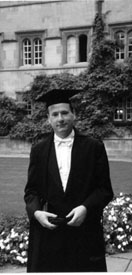
My first day at Oxford yielded the year's best anecdote. Two students, clad in blazers and what I remember as bowler hats, were greeting each other after the summer vacation.
"How are you, Nigel," one asked the other.
"Oh, I'm disgustingly well," replied Nigel, with great emphasis on the word disgustingly.
Perhaps it is more an image than an anecdote. Nevertheless, it is an image that could never be associated with Oberlin.
Oxford and Oberlin do share a love of learning, but beyond that they are almost antithetical as institutions. Though Oxford is no longer the haven for the upper class that it was in the past, to any right-thinking Oberlin student or alum it could only seem a rather decadent place.
Oxford cherishes formality. Before arriving, I was informed that I had to own a black gown (academic robe), black motor-board hat, black suit, black shoes, black socks, white shirt, and white bow-tie, if I hoped to matriculate. (Female students must purchase a similar uniform, although in place of a bow-tie, they wear an apparatus that looks to me like a cotton bolo tie.) The matriculation ceremony lasted for only a few dull hours while the chancellor of the university struggled to refute the claim that Oxford is a dinosaur, only to conclude that dinosaurs are "tough beasts that lasted for thousands of years." Predictably, the suit and gown have come in handy ever since.
One needs a suit for the fancy dinners put on in the university's many ancient dining halls, where the ethos that prevails is not quite that of the co-ops. The fairly elaborate meals are preceded by sherry and concluded with port. Whether such affairs are civilized or not is debatable; they are certainly formal.
All dining halls contain a high table for faculty and regular tables for students. The suit alone is sufficient if one is dining with fellow students. But those invited to high table by the faculty must wear the suit as well as the gown.
The gown--modest for undergrads, slightly more elaborate for graduate students, and formidable for professors--is worn to all important events on the academic calendar. Among these are collections, written exams taken at the beginning of each term, the results of which do not affect a student's status. The exams keep students apprised of their progress. There are no grades at Oxford. I, an undergraduate, meet once a week with my professor--without gown. I write an essay that we discuss for about an hour. Apart from optional lectures, this is the whole of an Oxford education. Students are evaluated in collections, and the quality of their degrees depends entirely on two weeks of written exams taken at the end of their courses, to which they wear the entire black outfit.
After the gradual English spring come the summer balls. Oberlin, whose sympathies lie with the Drag Ball, always seems a bit sheepish about its Talcott Formal, but Oxonians undertake their formals with the same intensity that Oberlinians do the Drag Ball. Oxford's balls are fairly conventional black-tie affairs, though a taste for extravagance has recently introduced some county-fair amenities--laser tag, bumper cars, and bucking broncos--into the evenings' entertainment.
Lingering on the formality of social and academic life at Oxford may result in an inaccurate portrait. I have seen professors wear jeans with their gowns, and I have seen students take their final exams in leather suits (black, of course). Oxford is composed of over 30 small colleges in which students eat and drink, study and exercise. These colleges are autonomous and diverse, and only a few embrace tradition without some reservations.
Also, the intellectual life of the university is for the most part impervious to the elitism around it. After a year's work here, I can testify to the vitality and rigor of historical study at Oxford. The tutorial system, as it's called, is a dialogue and not a rehearsal of dogma, liberal or conservative. I have not found Oxford intellectually disappointing--even after Oberlin.
And yet the traditions and atmosphere of the university as conveyed to the rest of the world in literature and myth do relate to reality, at least as far as my experience has gone. Often, and ironically, the American Oxonians are the quickest to attach themselves to the ideals of Oxford gleaned from Waugh's famous novel, Brideshead Revisited. But even if the first few tastes of forbidden fruit are enticing, those of us who come here from liberal arts colleges tend to keep our distance. Obies make for skeptical Oxonians.
Michael Kimmage is a Marshall Scholar studying modern European history at University College, Oxford. Although the college for centuries claimed to have been founded by King Alfred in 873, it actually dates from about 1249, when William of Durham bequeathed funds to Oxford for the maintenance of poor theological students. Michael will graduate in 1997, after which he hopes to pursue a doctorate in American history.
Return to the OAM Fall-Winter 1996 Table of Contents